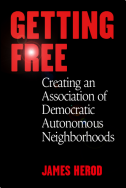Psychiatry
James Herod
April 1975
I'm more and more against psychiatry and therapy as a practice and as an institution, and for slightly different reasons than before. Earlier I have opposed (1) the reactionary outlook of the average therapist, and (2) the idea that a person's problems might be solved in a one to one situation, or even in a group situation, while leaving the larger social structure intact, by taking it as a given.
Now however there is another dimension to my opposition to psychiatry. What I am coming to hate most of all is the practice of intervention from the outside into a personal relation between two people. This is a very powerful tool to enable the establishment to intervene right down into the most intimate corners of private life (since in the last analysis psychiatrists are arms of the state, given their beliefs, their economic situations, and their certification). This is really incredible when you think of it. This intervention inflicts an enormous breach of faith on the party or parties not involved. Such things as friendship, confidentiality, trust, love, and mutual respect are wiped out in one swoop. These values are no longer possible. Everything becomes manipulation. What you discuss with your lover will get confided to the therapist. The therapist has an opening through which to intervene into a relationship between two people, but the third party (the one not seeing the therapist) has no easy way to intervene into the relationship between the friend or lover and the therapist. It is monstrous. And it comes from the outside perspective, from hierarchy. Therapists set themselves above everyone else and outside the fray. They are privy to all the relationships a person has while none of the other persons involved in the circle of friendships has such a position.
Thus in fact there is one primary relationship which is privileged above all the others, the rest being secondary. The judgments (and this is the crux of the matter) of the others involved in any matter of interpersonal life are excluded. Only the client's and the therapist's opinions are taken into account. This is what makes it authoritarian and manipulative. Therapists have established a formal structure of regular discussion about problems and conflicts in which some of the parties involved are systematically excluded, by design as it were. And all this is couched of course in the language of science. The therapist is billed as an authority, as an expert, on questions of people, or even as an outside, neutral, objective observer and commentator on the situation. Therapists are nothing of the kind of course.
The very idea that the intimate details of one's associations with others (mates, friends, colleagues) are reported to this other person, not as one would seek advice and help from a friend, but to this outside person, is disgusting. All the relationships one has thus become prostituted. It destroys the reciprocity. Life becomes a manipulative game. The whole thing is based also on a false idea of mental illness, needless to say, and a false location of personal problems inside the person. This practice destroys the dialectic. It fosters the acceptance of authority, and does so through the very essence of the therapy situation. Psychiatry serves to breakdown any defenses the individual might have toward authority. It is a way of reducing all relationships to this one relation of dependency to the therapist, with all the rest being manipulative.
Worst of all, the practice of therapy perpetuates the notion of confession to the authorities (tell mommy all about it). Total honesty is demanded by the therapist, that is, total confession and total exposure. Otherwise they say they will not be able to `help'. And this is what gives them their power. Knowledge is power. The practice inculcates attitudes which help the establishment in other spheres as well, in the police station, in court, with journalists and pollsters, in college, and in the workplace. Honesty is demanded mainly by Mothers, Priests, Therapists, Judges, Cops, Tax Collectors, Professors, and Capitalists.
It becomes a whole way of life, this therapy business. Everyone has a therapist and all relations with others thus get refracted through the analyst. This is especially noticeable in New York City. People come to think therapy and talk therapy, to the exclusion of all other styles. Therapy permeates their entire outlook, changing even their vocabularies and speech patterns. This phenomenon is probably less pronounced now than it was in the 1950's and 1960's, but it is still prominent and spreading. Guidance and counseling is everywhere. The counselors, those outside interveners, are extending their influence into every nook and cranny, from grade school on through to the doctorate. They're now in factories and offices, in private life, in churches, and in the welfare office.

